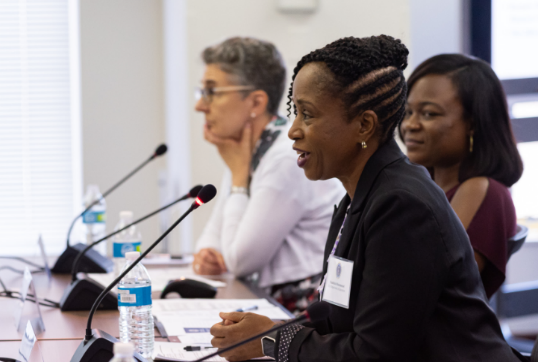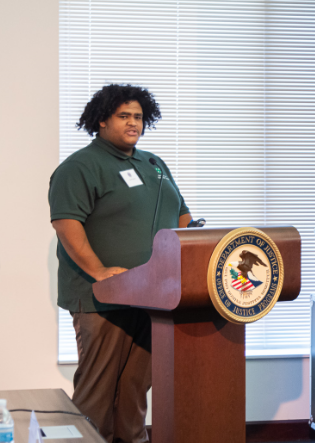
On September 12, 2019, OJJDP hosted a public meeting of the Coordinating Council on Juvenile Justice and Delinquency Prevention. The meeting highlighted a Department of Education program that supports supplemental educational services for at-risk and delinquent youth. In addition, the event featured testimonial from a 4-H Club member on the impact mentoring can have on a young person’s educational and vocational success.
 At the September 12, 2019, meeting of the Coordinating Council on Juvenile Justice and Delinquency Prevention in Washington, DC, Faatimah Muhammad (foreground), Supervisory Education Program Specialist at the Department of Education’s Office of Elementary and Secondary Education (OESE), joined other OESE staff (shown in the background) to discuss opportunities available for partnerships and funding through Title I, Part D of the Elementary and Secondary Education Act.
At the September 12, 2019, meeting of the Coordinating Council on Juvenile Justice and Delinquency Prevention in Washington, DC, Faatimah Muhammad (foreground), Supervisory Education Program Specialist at the Department of Education’s Office of Elementary and Secondary Education (OESE), joined other OESE staff (shown in the background) to discuss opportunities available for partnerships and funding through Title I, Part D of the Elementary and Secondary Education Act.These resources are offered under Title I, Part D of the Elementary and Secondary Education Act, which contains provisions for disadvantaged students. In fiscal year (FY) 2019, the program awarded $46.4 million to state education agencies through Subpart 1, $104.3 million to local agencies through Subpart 2, and $1.2 million to support the national technical assistance center.
Ms. Muhammad said she and her staff would attend the OJJDP State Relations and Assistance Division National Training Conference in Kansas City, MO, in late September to share information with states about partnerships and funding opportunities available through the Department of Education. Opportunities for collaboration exist not only through OESE, but also through the Department’s Office of Special Education and Rehabilitative Services; Office of Civil Rights; and Office of Career, Technical, and Adult Education.
 Clyde Van Dyke received the 2019 4-H Youth in Action Award for his commitment to using technology to support community change. “There really are no words that can fully express my gratitude to OJJDP and 4-H, because my life would have looked very different if I hadn’t been welcomed into the 4-H family.”
Clyde Van Dyke received the 2019 4-H Youth in Action Award for his commitment to using technology to support community change. “There really are no words that can fully express my gratitude to OJJDP and 4-H, because my life would have looked very different if I hadn’t been welcomed into the 4-H family.”His life changed when a friend invited him to a 4-H technology program in his hometown of Johnson City, NY. Not only did he learn about the technology field, but he was exposed to resources and opportunities that motivated him to do better in school and in life. “I walked into the next few years of school with a new mindset and a determination to try my hardest in school,” Clyde said.
Through the 4-H Club, Mr. Van Dyke learned how to create maps to visualize data, a technique known as “geospatial mapping.” He now uses geospatial mapping to help communities better understand the prevalence, trends, and contributing factors to critical issues such as the opioid epidemic. He also mentors young people in elementary schools near his hometown.
“I’m proud to say that because of 4-H and the adults who have supported me, I’m not a dropout,” he said. “I graduated from high school in June and just started college at the State University of New York at Delhi to pursue a career in digital forensics—a path I never would have discovered without 4-H.”
OJJDP has long supported the 4-H Club and other national and multistate mentoring programs. In FY 2018, OJJDP awarded more than $73.3 million through its Mentoring Opportunities for Youth initiative.
The Coordinating Council on Juvenile Justice and Delinquency Prevention is an independent body within the executive branch of the federal government operated under the Federal Advisory Committee Act. The council's primary functions are to coordinate federal juvenile delinquency prevention programs, federal programs and activities that detain or care for unaccompanied juveniles, and federal programs relating to missing and exploited children.
The council is made up of 22 members—13 ex officio and affiliate members and 9 practitioners. The ex officio members are: the Attorney General; the Administrator of the Office of Juvenile Justice and Delinquency Prevention; the Secretaries of the U.S. Departments of Education, Health and Human Services (HHS), Housing and Urban Development, and Labor; the Assistant Secretary of Immigration and Customs Enforcement in the U.S. Department of Homeland Security; the Director of the Office of National Drug Control Policy; and the Chief Executive Officer of the Corporation for National and Community Service. Affiliate members are the Secretaries of the U.S. Departments of Agriculture, Defense, and the Interior, and the Administrator of the Substance Abuse and Mental Health Services Administration of HHS. The nine juvenile justice practitioner members are appointed by the Speaker of the House of Representatives, the Senate Majority Leader, and the President of the United States. In accordance with the Federal Advisory Committee Act, the Council holds public meetings up to four times a year in which members discuss activities to facilitate and support cross-agency coordination.
